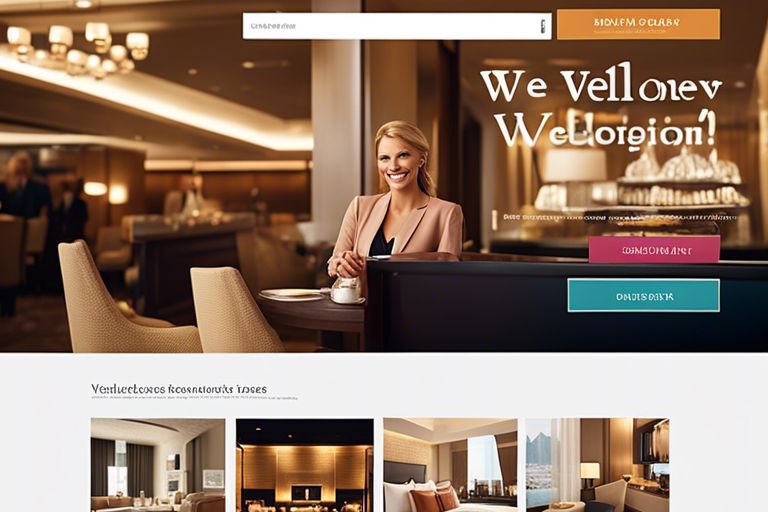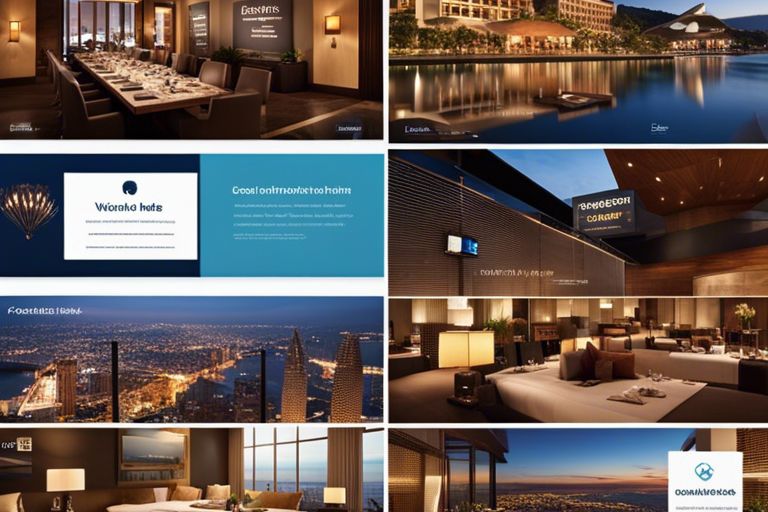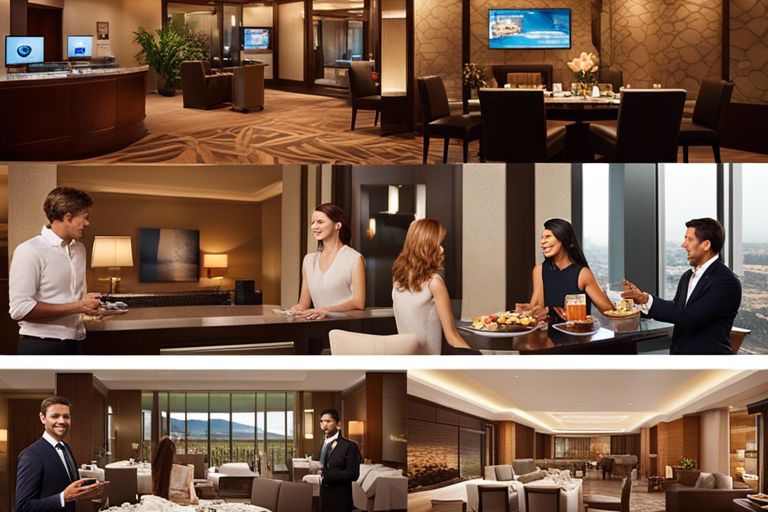In the dynamic and competitive world of hospitality, it is imperative for hotel owners and marketers to devise an effective marketing strategy in order to stand out from the crowd and attract guests. A well-crafted marketing plan can make all the difference in driving bookings, increasing revenue, and establishing long-term success for a hotel. This guide will provide you with essential steps and key insights on how to create a winning marketing strategy for your hotel.
Table of Contents
- 1 Setting Your Hotel Apart
- 2 Understanding Your Target Audience
- 3 Leveraging Digital Marketing Channels
- 4 Content Marketing Strategies for Hotels
- 5 Reputation Management and Customer Reviews
- 6 Partnerships and Collaborative Marketing
- 7 Measuring Success and Adapting Your Strategy
- 7.1 Setting realistic and measurable marketing goals
- 7.2 Analyzing key performance indicators (KPIs) to gauge success
- 7.3 Continuously refining your strategy based on performance and feedback
- 7.4 Recap: The pillars of an effective hotel marketing strategy
- 7.5 The ongoing journey of marketing innovation and adaptation
- 8 FAQ
- 8.0.1 Q: What are the key components of an effective hotel marketing strategy?
- 8.0.2 Q: How can a hotel establish a strong online presence for marketing purposes?
- 8.0.3 Q: What role does customer relationship management play in hotel marketing?
- 8.0.4 Q: Why is compelling visual content important for hotel marketing?
- 8.0.5 Q: How can a hotel focus on guest experiences as part of its marketing strategy?
Key Takeaways:
- Identify target audience: Knowing your target audience is crucial for creating a successful hotel marketing strategy. Understand the demographics, preferences, and behaviors of your potential guests.
- Utilize digital marketing: Invest in digital marketing efforts such as social media, SEO, and email campaigns to reach a wider audience and increase brand visibility.
- Highlight unique selling points: Showcase what sets your hotel apart from the competition, whether it’s luxurious amenities, exceptional customer service, or a prime location.
- Implement compelling visuals: Use high-quality images and videos to capture the attention of potential guests and create an emotional connection with your hotel brand.
- Encourage guest reviews and feedback: Positive reviews and testimonials from satisfied guests can significantly impact your hotel’s reputation and attract new visitors. Encourage guests to leave feedback through various channels.
Setting Your Hotel Apart
The key to a successful hotel marketing strategy lies in setting your hotel apart from the competition. In a saturated market, it’s essential to identify your unique selling proposition (USP) and embrace the power of storytelling in your marketing.
Identifying your unique selling proposition (USP)
For your hotel to stand out in a crowded marketplace, it’s crucial to identify what sets it apart from the rest. Your unique selling proposition (USP) could be anything from a prime location, exceptional customer service, or exclusive amenities. By highlighting your USP in your marketing efforts, you can create a compelling reason for potential guests to choose your hotel over others.
Embracing the power of storytelling in your marketing
Apart from listing your hotel’s features and facilities, storytelling allows you to create an emotional connection with your audience. By narrating the unique experiences and unforgettable moments that guests can expect at your hotel, you can inspire them to choose your property for their next stay.
Your storytelling should reflect the personality and values of your hotel, allowing potential guests to envision themselves as part of the story.
Understanding Your Target Audience
Even the most well-planned hotel marketing strategy will fall short if it does not effectively target the right audience. To drive success in your hotel marketing efforts, it is essential to have a deep understanding of your target audience and their needs. If you want to learn about some essential hotel marketing strategies, click here.
Researching and defining your ideal customer
Your hotel marketing strategy should begin with a detailed analysis of your ideal customer. This entails researching key demographics, such as age, income, preferences, and behaviors, to gain a clear understanding of who your target audience is. By defining your ideal customer, you can tailor your marketing efforts to meet their specific needs and preferences, thus improving the overall effectiveness of your strategy.
It is crucial to gather data from different sources, such as customer surveys, social media insights, and booking patterns, to create a comprehensive profile of your ideal customer. Understanding their interests, motivations, and pain points will help you shape your hotel marketing strategy in a way that resonates strongly with them.
Tailoring your messaging to meet the needs of different demographics
On top of defining your ideal customer, it is essential to recognize that your target audience is likely to be diverse, and thus, have varying needs and expectations. Tailoring your messaging to meet the needs of different demographics ensures that you can effectively engage with a wide range of potential guests and maximize your hotel’s appeal. It also allows you to address specific pain points and showcase the most relevant and enticing aspects of your hotel to different customer segments.
Leveraging Digital Marketing Channels
To create an effective hotel marketing strategy, it is crucial to leverage the power of digital marketing channels. In today’s digital age, hotels must establish a strong online presence to attract and retain guests. For a comprehensive guide on hotel marketing strategy, visit Hotel Marketing Strategy: 12 Essentials to Succeed.
Maximizing visibility through search engine optimization (SEO)
Marketing your hotel through search engine optimization (SEO) is essential to improve visibility and drive organic traffic to your website. By optimizing your website with relevant keywords, enhancing user experience, and obtaining quality backlinks, your hotel can rank higher on search engine results pages, increasing the chances of potential guests discovering your property.
Maximizing your SEO efforts also involves creating high-quality content, optimizing meta tags, and ensuring mobile-friendliness, which can contribute to a stronger online presence and improved brand visibility.
Effective use of social media to engage and attract guests
Leveraging social media platforms allows hotels to engage with their target audience, showcase their unique offerings, and attract potential guests. By creating compelling content, sharing visually appealing imagery, and leveraging targeted advertising, hotels can effectively reach and connect with travelers, ultimately driving bookings and enhancing brand loyalty.
To maximize engagement, hotels should regularly interact with followers, share user-generated content, and harness the power of influencer partnerships to expand their reach and amplify their social media presence.
To further enhance social media engagement and attract guests, hotels can also incorporate live streaming, storytelling, and interactive polls to create immersive experiences for their audience, fostering a sense of connection and community.
Exploring the benefits of email marketing campaigns
Email marketing campaigns provide hotels with a direct and personalized way to communicate with both prospective and past guests. By delivering tailored promotions, exclusive offers, and relevant content via email, hotels can nurture relationships, encourage repeat bookings, and drive direct revenue.
This strategic approach enables hotels to segment their audience, measure campaign performance, and refine their messaging, ultimately leading to higher engagement and conversion rates. Additionally, email marketing can serve as a valuable tool for promoting hotel amenities, announcing special events, and soliciting valuable feedback from guests.
Content Marketing Strategies for Hotels
Keep up with the latest marketing trends by incorporating content marketing strategies into your hotel’s overall marketing plan. Content marketing is a powerful tool for hotels to engage with their target audience, increase brand awareness, and drive direct bookings.
Creating compelling content that resonates with your audience
Compelling content is essential for capturing the attention of your audience and keeping them engaged. To create content that resonates with your audience, it’s important to understand their interests, preferences, and pain points. Conduct market research and gather insights to inform your content strategy. Tailor your content to address the specific needs of your target audience and provide solutions that will add value to their experience. Whether it’s travel tips, local attractions, or personalized stories, compelling content should be authentic, relevant, and relatable.
Furthermore, storytelling is a powerful way to connect with your audience on an emotional level. Share narratives that showcase the unique aspects of your hotel, such as its history, design, or the experiences of your guests. By evoking emotion and creating a memorable experience, you can leave a lasting impression on your audience and differentiate your hotel from competitors.
Utilizing blogs, videos, and virtual tours to showcase your hotel
An effective way to showcase your hotel is through a variety of content formats, such as blogs, videos, and virtual tours. Blogs allow you to share in-depth information about your hotel, local attractions, events, and insider tips. Videos provide a visual and immersive experience, allowing potential guests to get a real sense of your hotel’s ambiance, amenities, and overall atmosphere. Additionally, virtual tours offer an interactive and engaging way for guests to take a virtual walk-through of your hotel, giving them a sense of what to expect before they arrive.
Any compelling content should be visually appealing and professionally produced to convey the quality and experience your hotel has to offer. High-quality visuals and engaging storytelling will help create a strong impression and inspire potential guests to choose your hotel for their next stay.
Harnessing user-generated content to build trust and authenticity
One of the most powerful forms of content is user-generated content, which includes reviews, photos, and testimonials from previous guests. User-generated content provides social proof and genuine experiences, building trust and authenticity for your hotel. Encourage guests to share their experiences on social media and review platforms, and leverage this content to showcase the real-life experiences of your guests. By featuring user-generated content on your website and social channels, you can increase credibility and influence potential guests’ purchasing decisions.
User-generated content also creates a sense of community and belonging, as it allows guests to see themselves represented in the content. This fosters a deeper connection with your audience and reinforces a positive image of your hotel as a welcoming and inclusive destination.
Reputation Management and Customer Reviews
For hotels, reputation management and customer reviews play a crucial role in attracting new guests and retaining existing ones. In today’s digital age, a hotel’s online reputation is largely shaped by the reviews and ratings it receives from past guests. Therefore, it is essential for hoteliers to proactively manage and monitor their online reputation to ensure a positive perception among potential guests.
Monitoring and responding to online reviews
Responding promptly and professionally to online reviews is vital in maintaining a positive reputation. Whether the feedback is positive or negative, acknowledging and addressing guest reviews demonstrates a proactive approach to customer satisfaction. By monitoring reviews across various platforms, hotels can promptly address any issues and show potential guests that their concerns are taken seriously.
Encouraging satisfied guests to leave positive feedback
One effective way to encourage satisfied guests to leave positive feedback is by sending post-stay emails with links to review platforms. Additionally, offering incentives such as discounts on future stays or complimentary services can motivate guests to share their positive experiences online. This can result in an increase in positive reviews, which can further enhance the hotel’s reputation and attract new guests.
For instance, hotels can strategically place signage within the property encouraging guests to leave a review, or train staff to politely request feedback at the end of a guest’s stay. These small efforts can yield significant results in boosting positive online reviews.
Handling negative reviews professionally and constructively
For hotels, addressing negative reviews in a professional and constructive manner is imperative. Rather than dismissing or ignoring negative feedback, acknowledging the concerns and offering a resolution demonstrates a commitment to guest satisfaction. Responding to negative reviews with empathy and a willingness to address the issues can potentially mitigate any damage to the hotel’s reputation.
Online reputation management tools can help hotels track and analyze their online reviews, providing insights into areas for improvement. By identifying common themes in negative feedback, hotels can implement operational changes to address recurring issues, ultimately improving the overall guest experience.
Partnerships and Collaborative Marketing
Not sure where to start with your hotel marketing strategy? Creating A Hotel Marketing Strategy | Free PDF Download can help you get on the right track. But one of the most effective ways to expand your reach is through partnerships and collaborative marketing. By teaming up with other businesses or attractions, you can tap into new audiences and create unique experiences for your guests.
Building relationships with local businesses and attractions
For hotels, establishing partnerships with local businesses and attractions is an excellent way to offer guests a comprehensive experience. Whether it’s collaborating with a nearby restaurant to provide dining discounts for your guests or partnering with a local tour company to offer exclusive packages, these relationships can add significant value to your guests’ stay. By showcasing the best that your destination has to offer, you are not only enhancing your guests’ experience but also creating a positive impression of your hotel.
Exploring co-marketing opportunities and package deals
For hotels looking to maximize their marketing efforts, exploring co-marketing opportunities and package deals can be extremely beneficial. By partnering with local businesses, such as spas, restaurants, or entertainment venues, you can create attractive packages that offer added value to your guests. These collaborations not only help in promoting your hotel but also in showcasing the local offerings, giving guests compelling reasons to book with you. Additionally, it allows you to tap into the existing customer base of your partners and reach new audiences who may be interested in what your hotel has to offer.
Local co-marketing opportunities and package deals can help boost your hotel’s visibility, drive bookings, and enhance the overall guest experience. Strategic collaborations can also differentiate your hotel from competitors and position it as an integral part of the local community.
Leveraging influencer marketing to reach new audiences
deals with local influencers can also be a powerful tool for hotels to reach new audiences and promote their unique offerings. By partnering with influencers who have a strong following and influence in the travel and hospitality space, hotels can tap into their network to showcase their property, amenities, and experiences. Leveraging influencer marketing not only helps in expanding your reach but also in building trust and credibility with potential guests. An authentic and compelling endorsement from the right influencer can significantly impact the decision-making process of potential travelers, ultimately driving bookings and revenue.
It is important to carefully select influencers whose audience aligns with your hotel’s target demographic and brand values to ensure that the partnership delivers the desired results. When executed effectively, influencer marketing can yield substantial returns by increasing brand awareness, engagement, and bookings.

Measuring Success and Adapting Your Strategy
Despite the most carefully crafted hotel marketing strategy, the real test lies in the ability to measure its success and adapt it based on performance data and market feedback. In order to ensure the effectiveness of your hotel marketing efforts, it is crucial to have a structured approach towards measuring success and making necessary adjustments to your strategy.
Setting realistic and measurable marketing goals
Measuring the success of your hotel marketing strategy begins with setting realistic and measurable goals. Whether it’s increasing direct bookings, boosting occupancy rates, or enhancing brand visibility, your goals should be quantifiable and achievable within a specified timeframe. By establishing clear benchmarks, you can effectively monitor the performance of your marketing activities and make informed decisions about the next steps.
It’s essential to align your marketing goals with your overall business objectives and consider the specific needs and characteristics of your target audience. This approach will enable you to track progress more accurately and make necessary adjustments to your strategy accordingly.
Analyzing key performance indicators (KPIs) to gauge success
KPIs serve as critical tools for evaluating the effectiveness of your hotel marketing strategy. From website traffic and conversion rates to social media engagement and customer retention, these indicators provide valuable insights into the performance of your marketing initiatives. By analyzing KPIs, you can identify areas of strength and weakness, and make data-driven decisions to optimize your strategy for better outcomes.
The ability to effectively monitor and interpret KPIs is essential for driving business growth and maximizing the impact of your marketing efforts. Investing in data analysis tools and expertise will empower you to continuously refine your strategy, ultimately leading to improved performance and greater return on investment.
Continuously refining your strategy based on performance and feedback
Setting the foundation for ongoing success, the process of refining your hotel marketing strategy is a continuous cycle that hinges on performance analysis and customer feedback. By closely monitoring the impact of your marketing initiatives and gathering insights from guest experiences, you can proactively adapt your strategy to meet evolving market dynamics and consumer preferences.
Embracing a culture of continuous improvement and responsiveness to feedback will position your hotel for long-term success in a competitive marketplace. It’s imperative to prioritize agility and adaptability, as these traits will serve as key differentiators in achieving sustained growth and guest satisfaction.
Recap: The pillars of an effective hotel marketing strategy
One of the pivotal aspects of an effective hotel marketing strategy is the ability to measure success, analyze performance, and adapt to market shifts. By setting realistic and measurable goals, leveraging KPIs, and continuously refining the strategy based on feedback, hotels can maximize their marketing impact and achieve sustained growth.
The ongoing journey of marketing innovation and adaptation
Marketing in the hotel industry is an ongoing journey of innovation and adaptation, driven by the quest for sustained success and competitiveness. As consumer preferences and market dynamics evolve, hotels must remain proactive in embracing new trends, technologies, and strategic approaches to stay ahead of the curve and maintain their relevance in the industry.

FAQ
Q: What are the key components of an effective hotel marketing strategy?
A: An effective hotel marketing strategy should include a strong online presence, targeted advertising, customer relationship management, compelling visual content, and a focus on guest experiences.
Q: How can a hotel establish a strong online presence for marketing purposes?
A: To establish a strong online presence, a hotel should invest in a user-friendly and visually appealing website, optimize for search engines (SEO), maintain active social media profiles, and engage in online reputation management.
Q: What role does customer relationship management play in hotel marketing?
A: Customer relationship management is crucial for building and maintaining guest loyalty. Hotels can use CRM systems to personalize marketing efforts, gain insights into guest preferences, and communicate effectively with past, current, and potential guests.
Q: Why is compelling visual content important for hotel marketing?
A: Compelling visual content, such as high-quality photographs and videos, can showcase a hotel’s unique features, amenities, and experiences, thereby capturing the attention of potential guests and influencing their booking decisions.
Q: How can a hotel focus on guest experiences as part of its marketing strategy?
A: To focus on guest experiences, hotels can highlight positive guest reviews and testimonials, offer special promotions or packages that enhance the guest experience, and prioritize exceptional customer service at every touchpoint.










